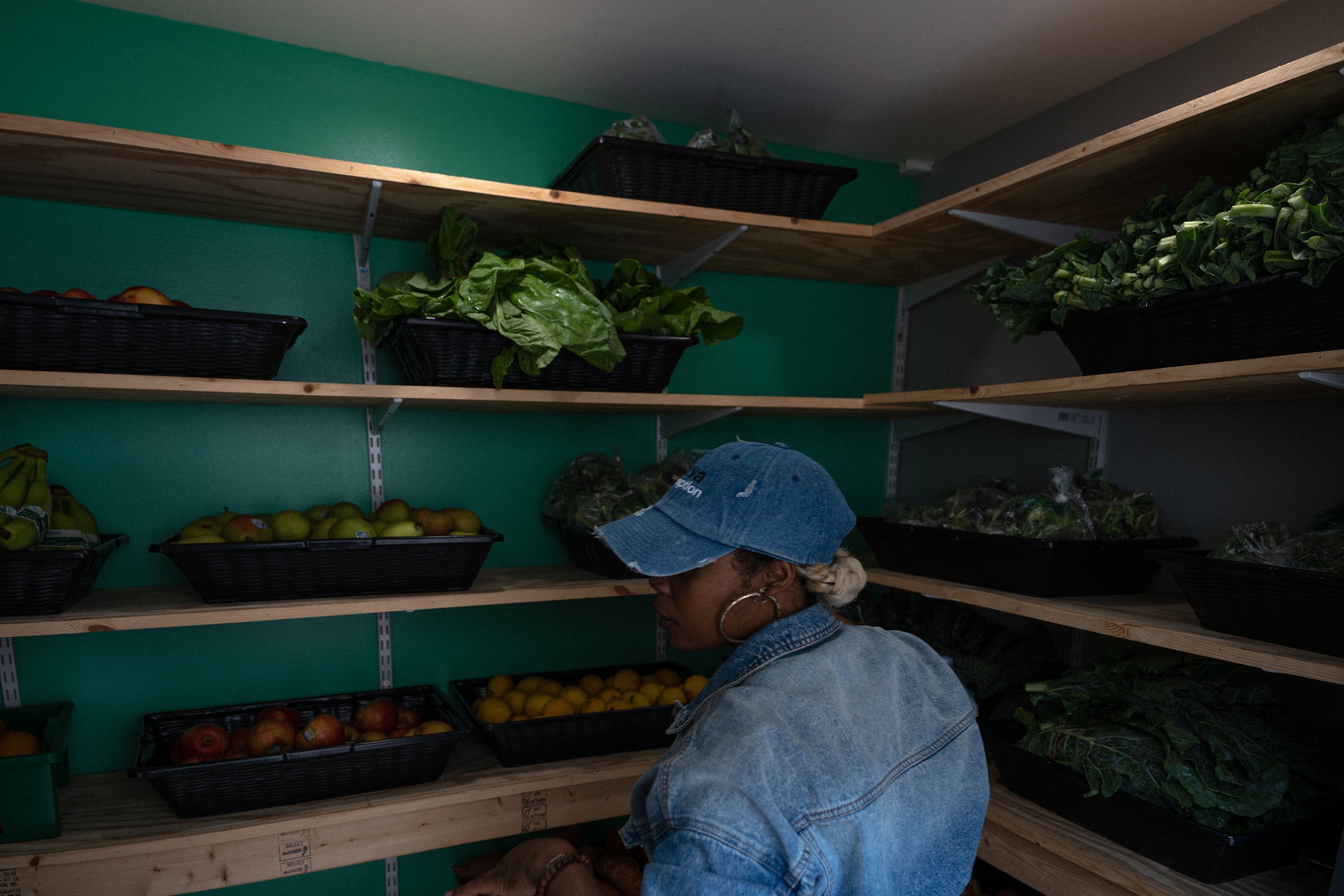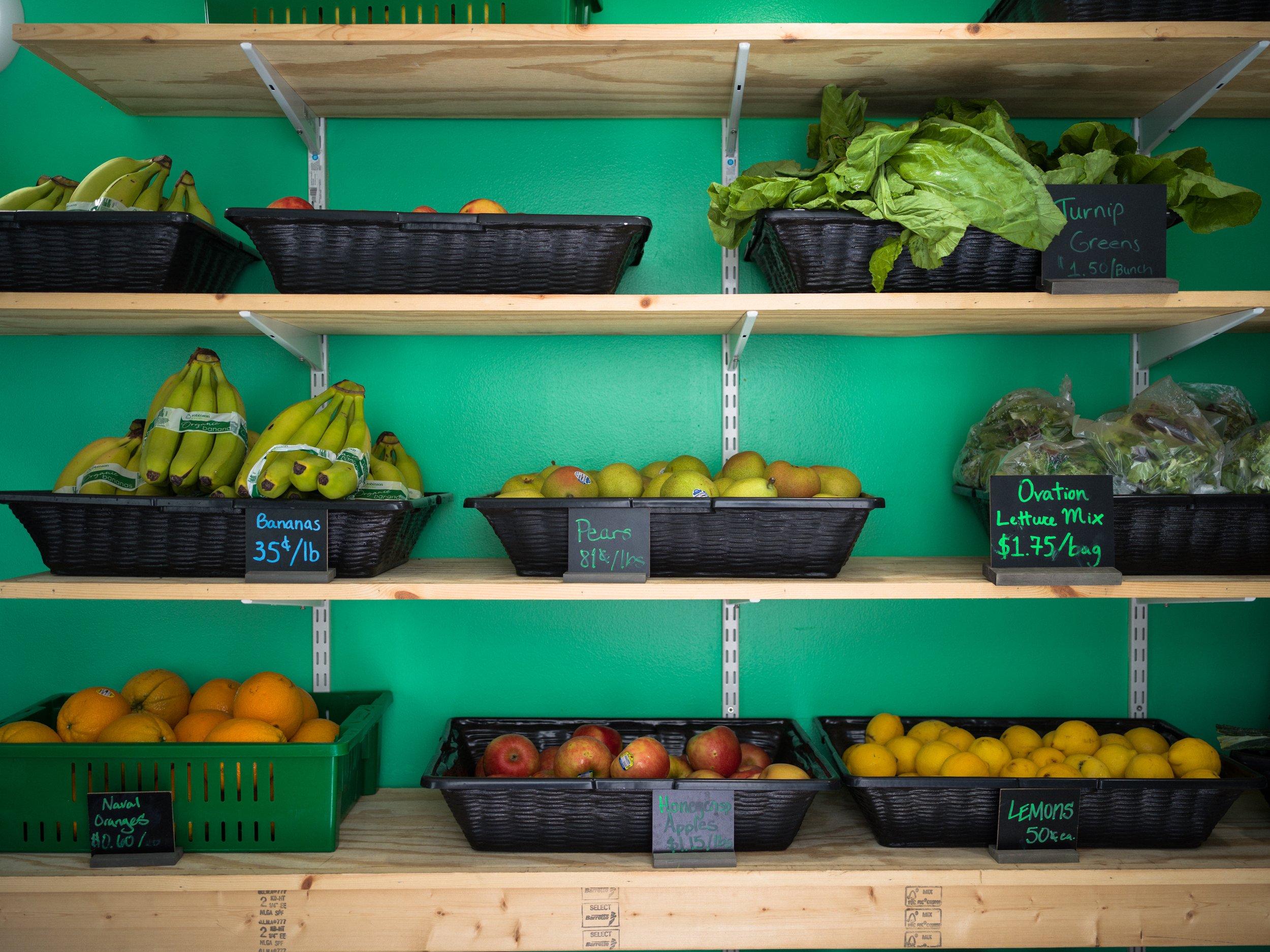Tired of city officials’ promises to bring more grocery retailers to their neighborhoods, urban farmers and local organizers aren’t waiting around.
By Jerrel Floyd, City Bureau
Traci Williams browses the fresh food options at Stein Learning Gardens at St. Sabina, a farm at 7840 S Racine Ave. in Auburn Gresham where community members can buy food on Wednesdays at a sliding scale. (Photo: Sebastián Hidalgo/City Bureau)
On a misty Wednesday last week, volunteers lined up baskets filled with leafy greens, turnips and fruits at an Auburn Gresham farm for community members.
When the weather is warm and clear, people stand in line down the block for their weekly grocery run at the farm, Stein Learning Gardens at St. Sabina, where produce is free for those who can’t afford it. Others pay what they can. Last week, people trickled in slowly to avoid the rain.
“There’s no stores, they’re all closed down,” said Deborah Bean, an Auburn-Gresham resident who was there to pick up produce.
The farm, 2.5 miles south of the Englewood Whole Foods that is scheduled to close this year, started out as a community garden and educational program in 2018 to connect people to fresh foods. Last year, organizers with the garden launched a pop-up free farm stand that is now open every Wednesday afternoon.
Urban farmer Robert Johnson said the need for fresh food continues to increase. He helps maintain the garden beds at Stein Learning Gardens at St. Sabina. (Photo: Sebastián Hidalgo/City Bureau)
Robert Johnson, who tends the garden four days a week, said the efforts, while important, are not enough to meet the need.
“We probably really and truly need to be growing more,” he said.
Many nonprofits and community organizations like Stein Learning Gardens have emerged to assist with the food needs that have worsened due to the COVID-19 pandemic. West and South Side communities are now struggling with skyrocketing food prices and dealing with a wave of store closures that has expanded the footprint of so-called food deserts (or food apartheid, as local food organizers have described it).
"This literally is the worst case scenario,” said Kemdah Stroud, a West Garfield Park organizer who launched Thankful for Chicago, a nonprofit that established a food distribution program early in the pandemic. "I don't think we can rely on business at this point anymore...we have to take matters into our own hands."
Broken Promises
Chicago mayors from Richard M. Daley to Rahm Emanuel to Lori Lightfoot have promised to address “food deserts” by trying to lure grocers to those communities, offering financial incentives, land and the city’s support. Despite the efforts, more than hundreds of thousands of Chicagoans still lack access to fresh foods.
Emanuel was credited for drawing attention to “food deserts,” hosting conversations to address the issue and for out-of-the-box ideas like pushing Walgreens to offer fresh produce. But critics say Emanuel's attempts at solving the problem were unsuccessful because the community was not involved, an issue that they continue to raise now with Lightfoot’s administration.
Last summer, Lightfoot, city officials and nonprofit leaders announced the Food Equity Agenda, an initiative that aims to connect residents to healthy food and eliminate barriers to community farming. Earlier this year, the city created the Food Equity Council made up of more than 20 city officials and organizers tasked with creating an action plan.
"Through this effort, we will be able to build stronger and healthier communities for years to come and root equity and inclusion at the heart of our food ecosystem," Lightfoot said when the agenda was unveiled.
Though those efforts are welcomed, some community members and organizers say Lightfoot isn’t moving fast enough. Bottom line, they say, city leaders have yet to deliver a sustained solution to retain grocery stores in low-income communities. They point out that the announced closure of the Whole Foods in Englewood follows Aldi's abrupt closure of a store in West Garfield Park and the earlier closure of a Save-A-Lot in Auburn Gresham.
Lightfoot’s administration did not respond to City Bureau’s interview request.
In response to what they say are empty promises and rising need, several mutual aid groups and nonprofits have emerged. Among them is Dion’s Chicago Dream in Englewood, a nonprofit that launched in 2020 and runs a community fridge on weekdays. It also delivers weekly fresh produce to nearly 1,300 underserved families in 77 neighborhoods.
The organization’s founder and executive director, Dion Dawson, who was born and raised in Englewood, said the deliveries include 80 homes less than a mile from the Whole Foods in Englewood, even before its closure was announced.
“We are going to always be there for them," he said.
Dawson said residents like himself have ideas about how to address food deserts, but are rarely asked. For Dawson, he tries not to focus on trying to reach politicians or even in having a seat at a table. He simply wants to directly address immediate community needs.
"Because I've been a nobody my entire life," he said. "I'm going to make sure I focus on the things that matter the most –– the people."
A $1 proposal in West Garfield Park
In West Garfield Park, a group of residents is trying to convince a grocer to sell them a closed grocery store building for $1 and has collected 3,000 signatures supporting the idea. The store, an Aldi on West Madison Street, closed in October after a 30-year run, leaving a community with more than 17,000 residents to strategize over where to get fresh food. The only other option for fresh produce is now a Save-A-Lot store about 1.5 miles south, which temporarily closed back in February following a rodent infestation.
TJ Crawford, a West Garfield Park resident and executive director of the Garfield Park Rite to Wellness Collaborative, said the Aldi store closed without warning. It hurt that residents learned of the closure by walking up to a closed gate, boarded windows, trash cans and a torn-down sign.
"If [Aldi] saw people, they wouldn't have closed their doors," said Crawford.
A group of residents in West Garfield Park is trying to convince Aldi to sell them a closed store for $1 and has collected 3,000 signatures supporting the idea. The Aldi on West Madison Street abruptly closed in October after a 30-year run. (Photo: Jerrel Floyd/City Bureau)
That’s why West Garfield Park residents aren't letting the grocery store disappear in silence. Since the store's closure, community members have launched petitions and held demonstrations calling for accountability for Aldi's sudden departure. They’ve reached out to and are currently vetting different grocery vendors that could potentially replace it.
Crawford and his team say the $1 sale would show that Aldi wants to be a good corporate citizen. It’s the least the company could do after deserting the residents like a bandit in the middle of the night. "There should be a moral or human will to make sure folks live in an environment that supports their well being," Crawford said.
Despite their efforts, Aldi's leadership has not responded to their proposal. The company has listed the property for sale for $700,000.
Aldi did not respond to City Bureau’s request for comment.
City Council approved in February a Lightfoot administration plan to spend up to $700,000 to buy the building from Aldi and then find a grocer to sell it to. Some alders questioned whether the city should buy empty property before lining up a tenant.
Peter Strazzabosco, the deputy commissioner with the Chicago Department of Planning and Development said they're still holding off finalizing the purchase. The plan, he said, is to be a backup in case organizers’ plans to purchase the building themselves are unsuccessful.
Food vs. housing in Auburn Gresham
Last year, Auburn Gresham residents pushed back when a development team calling itself Evergreen Imagine got the city’s approval to build an affordable housing and retail project there.
For them the need for a grocery store outweighed the need for affordable housing, especially since losing its only centrally located grocery store a year earlier. The store, a Save-A-Lot on Halsted Street, remains vacant today despite promises from city officials to find a new grocer to take over the building.
Dakarai Howard instinctively understood why residents pushed back. Howard was born and raised in Auburn Gresham and now works as an equitable supply chain development specialist with the Chicago Food Policy Action Council, a nonprofit that advocates for the right to healthy and culturally-appropriate food in communities of color. His job involves connecting with, supporting and advocating for local Black and brown farmers.
Growing up, he said his family was lucky to have a car. And he remembers his aunts and grandmother crowding in that car to make routine grocery trips because they didn’t have a grocery store within walking distance. Families who used public transportation for grocery runs had to choose items with a long shelf life since grocery trips were rare.
For as long as he can remember, Auburn Gresham has been a residential neighborhood, so it puzzles him why there isn’t a grocery store in the community.
"It's hard to justify you adding more people to the people who are already demanding food," he said, referencing the plan to build a new affordable housing project.
In an ideal world, Howard said residents would feel empowered to not feel like they have to choose between prioritizing food or housing. But the need for fresh food is larger than the current need for affordable housing there.
Urban farmer Robert Johnson helps maintain the garden beds at Stein Learning Gardens at St. Sabina. (Photo: Sebastián Hidalgo/City Bureau)
Last week, on a break from tending the urban farm in Auburn Gresham, Johnson, the gardener, said the fresh food he grows is a move beyond empty words and toward tangible solutions.
“It’s amazing how many folks have been coming to that food stand,” Johnson said.
Moses Williams, the director of the Stein Learning Gardens, said some of the people who shop at the farm can’t afford to go elsewhere for fresh foods. In a way, he said, the farm balances that need with people who want to help.
"And as hard as it can be sometimes, I can see a lot of hope," Williams said.
Fresh food is sold on a sliding scale on Wednesdays at Stein Learning Gardens at St. Sabina, an urban farm in Auburn Gresham. (Photo: Sebastián Hidalgo/City Bureau)
Jerrel Floyd is City Bureau’s engagement reporter covering economic development and segregation in Chicago. You can reach him with tips at jerrel@citybureau.org.
This story is available to republish under a Creative Commons license. Read City Bureau’s guidelines here.
Support City Bureau’s community-centered reporting by becoming a City Bureau sustaining donor today.
To get twice-monthly emails including Chicago news and events, sign up for City Bureau’s Chicago newsletter.





